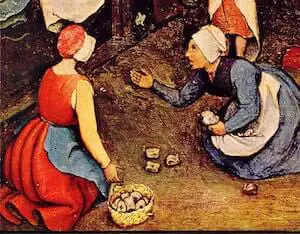‘First dibs’ is an exclamation that is used, primarily by children but also by adults, to establish a claim on something. The first person to call out ‘dibs’ or ‘first dibs’ has the option on the first use or the ownership of the item claimed.
First dibs
What's the meaning of the phrase 'First dibs'?
What's the origin of the phrase 'First dibs'?
Of course, in establishing the source of ‘first dibs’ it’s the ‘dibs’ part that requires explaining. The OED lists many meanings of the word dib:
– A small hollow in the ground or a puddle – known since the 1840s.
– A game played by children (also called dibbs, or dibstones) with pebbles or the knucklebones of sheep; also the name of the play pieces – known since the late 17th century.
– A children’s word to make first claim on something – known since 1907.
– A counter used in card games as a substitute for money.
– A slang term for money – known since 1808.
– A pointed gardening tool used for making holes for seeds (also called a dibber) – known since 1891.
We can’t now be sure which of these, or indeed another meaning of ‘dib’ was the source of ‘first dibs’ but the ‘children’s claim made on something’ has to be a strong contender. It also seems likely that the game dibs, a.k.a. dibstones, which involves the claiming of the dibstones by calling out ‘dibs’ is how ‘first dibs’ originated.
Dibstones is known to have been played since 1693 as it was recorded in the English philosopher Jock Locke’s Some Thoughts Concerning Education, which was published that year:
I have seen little Girls exercise whole Hours together and take abundance of Pains to be expert at Dibstones as they call it.
‘Dibs’, in the form of ‘dibbs’ or ‘dibstones’, originated in England but all of the early citations of ‘first dibs’ are from the USA. In fact, ‘first dibs’ isn’t an expression that is often used in the UK, where children are more likely to claim things by ‘bagging’ them – as in ‘bags I go first on the swings’.
It is entirely plausible that the ‘claim’ meaning of ‘dibs’ travelled to the USA from England as people migrated there. Any child who called out ‘dibs’ when playing dibstones would surely continue to do so whether on Olde England or New England.
‘First dibs’ was certainly in use in the USA by the early 1900s. The Wisconsin Home and Farm School Association was a charitable group that aimed provide housing and education for homeless boys. In 1907 they published a pamphlet called Our Boys, which includes these text:
When a morsel is left
In a cooking dish,
This short little sentence
will voice a boy’s wish.Each boy cries out
As quick as he can.
“I got first dibs
On the baking pan.”
This example of ‘first dibs’ suggest that the expression was well-known to street children in Wisconsin in 1907.
We spend less time in fields now than before and during the 20th century the term was further extended to include opportunity as well as enjoyment; for example, ‘Clergyman found drunk in nightclub – the tabloids will have a first dibs with that’.
The history of “First dibs” in printed materials
Trend of first dibs in printed material over time
Related phrases and meanings
Browse more Phrases
About the Author

Phrases & Meanings
A-Z
A B C D E F G H I J K L M N O P Q R S T UV W XYZ
Categories
American Animals Australian Bible Body Colour Conflict Death Devil Dogs Emotions Euphemism Family Fashion Food French Horses ‘Jack’ Luck Money Military Music Names Nature Nautical Numbers Politics Religion Shakespeare Stupidity Entertainment Weather Women Work
How did we do?
Have you spotted something that needs updated on this page? We review all feedback we receive to ensure that we provide the most accurate and up to date information on phrases.
